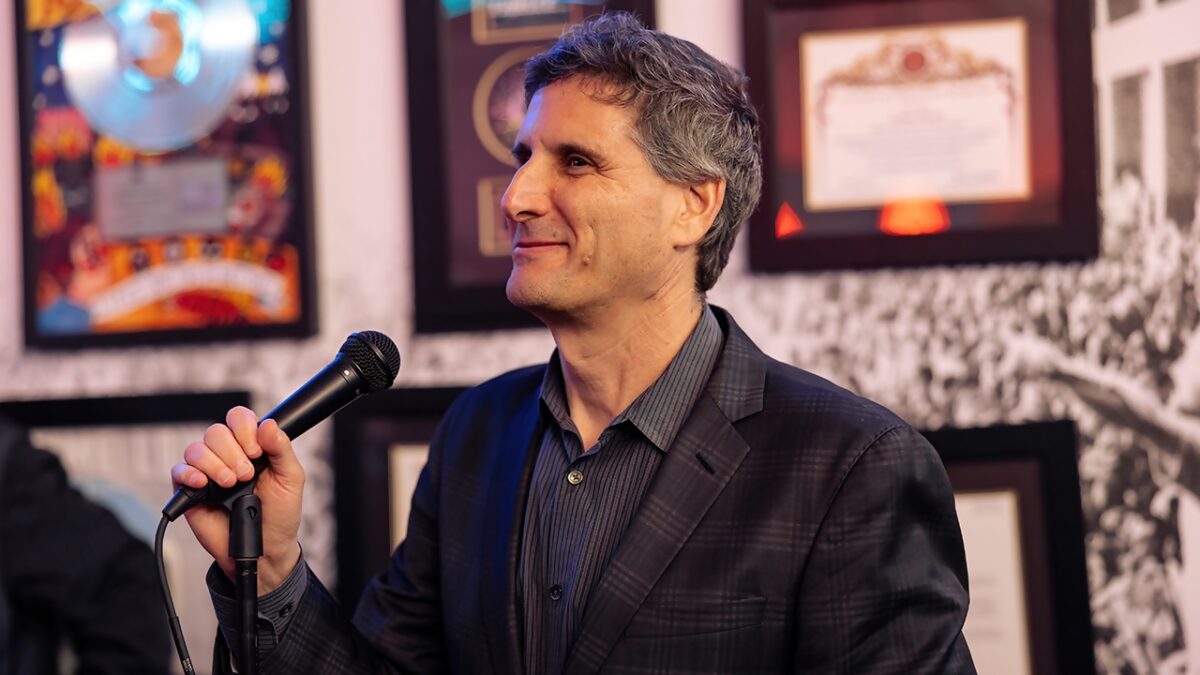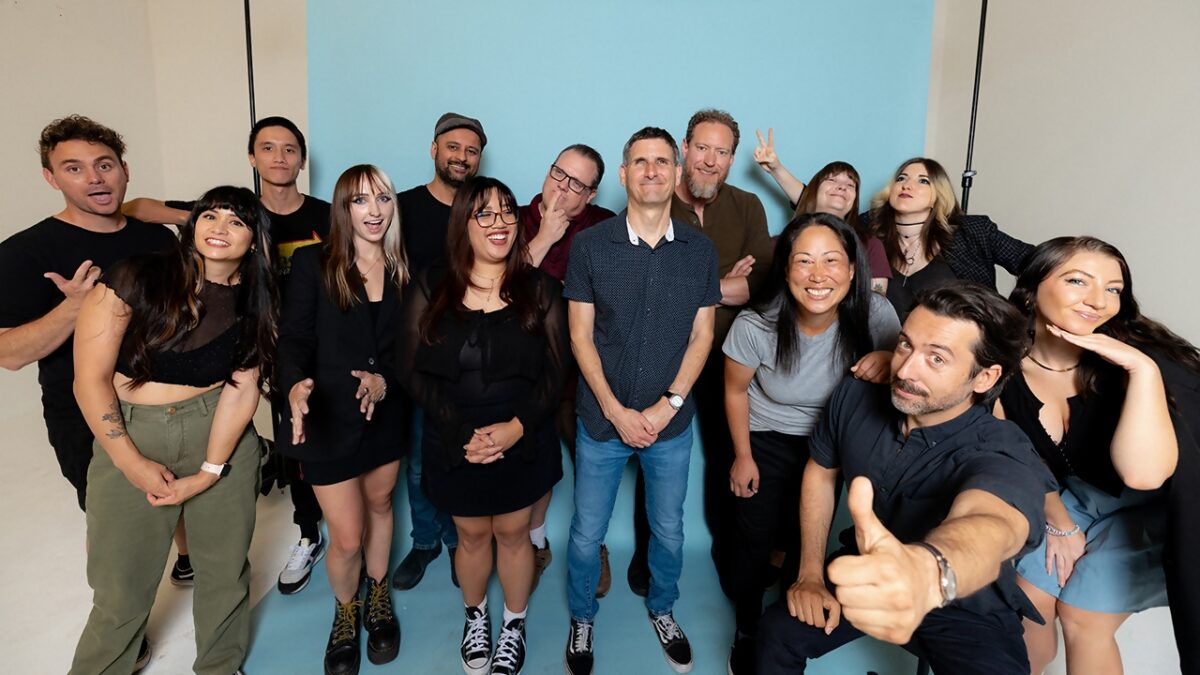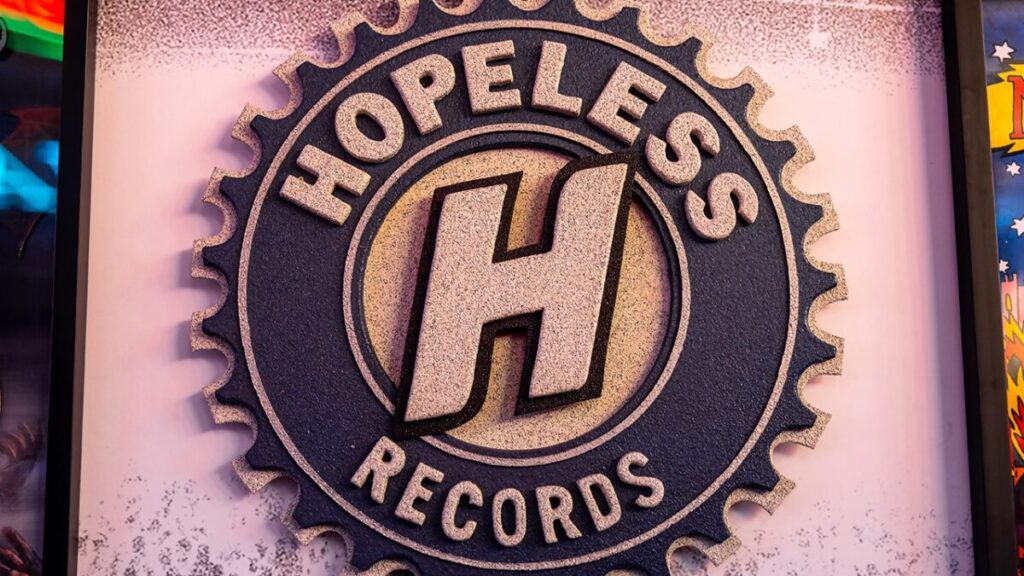Louis Posen never had any intention of starting a label.
But 30 years later, he is sure glad Hopeless Records has meant he hasn’t had to get any other sort of job. Though life always works in funny ways like that. One minute, you’re in film school directing music videos for NOFX, and the next, you are the central point of one of alternative music’s biggest, brightest and most brilliantly vast communities. Through industry ebbs and flows, expansive and audacious trends and the entire infrastructure of how people consume music changing time and time, Louis has never let any of it get in the way of why he loved the scene in the first place. The same attitude that made him fall in love with punk as a teenager runs through everything that Hopeless do today and will until the very end.
“A big thing for us is that we have always come from being underdogs,” he explains. “We have never been so egotistical to think we know everything. With each year we are learning and adapting to what is happening in the industry as much as what is happening in the scene. Because the scene isn’t going to stay the same. It shouldn’t. So we are always looking at what’s happening next and how young alternative geeks, freaks and weirdos are feeling right now. They certainly aren’t the same as when I was a kid in the 80’s.”
The fact that the first Hopeless release resulted from a dare says all you need to know about how far Louis was from making this a business. That dare came into play back in 1993 courtesy of Huntington Beach’s Guttermouth, who Louis was directing a music video, combining his film school education with his deep-set love for California punk. He had no money, plan, or idea of how to even think about putting songs on vinyl. But punk is about helping those around you. Thanks to being an avid reader of iconic zines such as Maximum Rock And Roll and Flipside, filled with ads for record pressing plants, vinyl sleeve makers and even mixing and mastering contacts, he could find everything that he needed. So, with a thousand dollars borrowed from his brother and a scene ready to support, ’11 oz’ by Guttermouth was pressed, and Hopeless Records was born.
“The beginning of things was very much like how you build a house. The foundation is only as good as what you put on top of it. Luckily, our foundation is built on do-it-yourself but also built on principles. It’s built on ideas and ideals in which we want to do business as much as we want to live life. While those have somewhat evolved, they have been more about revealing what was already inside over time.”
Those ideals can still be found on the Hopeless website today. Promoting a community that is safe and inclusive for everyone, fighting systematic injustices and uplifting underrepresented voices, being compassionate, respectful and honest even in difficult situations, and most importantly, understanding that the community is bigger than them. That final point was even more relevant as things started to pick up pace for Louis throughout the 90s. At a time when Green Day and Rancid were breaking through and introducing punk rock to an entirely new audience, and Brett Guewitz and Fat Mike were showcasing some of the best the scene has to offer with Epitaph and Fat Wreck Chords, it was vital to remember that this wasn’t a competition but more a shared surge. No matter the level, everybody was doing their bit.
“To be honest, I lost touch with those artists when they got big enough. It wasn’t that I didn’t like the music, it’s just they weren’t at the shows anymore. They weren’t hanging out or a part of the conversation. But they opened the genre up to more people, and then record stores looked more seriously at stocking something. So, our job was to put out an 88 Fingers Louie record and see how it goes whilst knowing that we treated them and their partners well so that other people may want to work with us in the future. It was all really positive.”
By 2000, Louis had put out records for everyone from Mustard Plug to The Queers, holding up unique, brash and inspiring voices in the underground and beyond. But with a new millennium comes new ideas, and in spreading their wings even further in terms of ground that could be covered, Hopeless really started to cement their own identity. Where the 90s had been, “us being a different version of other labels”, attention was turning to the bands that would be playing the local shows but were breaking the boundaries with their sound and messaging. That’s how Thrice‘s ‘The Illusion Of Safety’ and Avenged Sevenfold‘s ‘Waking The Fallen’ come into play, bands existing on the heavier side of things but still touring and working with the people, both on stage and behind the scenes, that had found their place in the underground. And when your whole ethos is built on inclusion, who are you to say who does and doesn’t fit in?
“We never subscribed to the idea that we were in charge of who was in or out of the scene,” Louis states. “We always thought that we were the weirdos and geeks ourselves, so we should be the ones who are inclusive. The whole point was that other people weren’t letting us into their communities. It would be wrong for us to do the same thing when we built up our own community, having a broader tent of what we were interested in and a broader idea of who our audience could be.”

Then, when you throw in the small matter of the Internet becoming a new space for sharing music worldwide, the scope of what is possible becomes even more significant. The communities built from the ground up in VFW halls and dingy bars suddenly gain members in completely different countries. Ideals and aims are being shared in ways that cross cultural lines. And, more than anything, the potential for a song or artist to break out is suddenly higher than ever. For Louis, Hopeless needed to stay on the right side of this change, not letting how things used to dictate how they handled business. The result was All Time Low, Amber Pacific, There For Tomorrow, and The Dangerous Summer, going from unknown upstarts to global sensations, all thanks to the label working in tune with the likes of MySpace and Pure Volume to bring amazing music to all who were seeking it.
“I remember meeting the Pure Volume guys at the very beginning, and it started as just a crazy idea that they were working on. MySpace was exactly the same way. These were communities built because they loved it, and they loved the artists who were involved. So many places have started that way, and it’s part of the beauty of this community that people outside of it don’t understand. Identity, culture, lifestyle, safety, and comfort. There’s a practical social-economic effect.”
“They talk in governments about social mobility and that there are limited places that people can move up in society,” he continues. “But our music community as a whole is an amazing place where someone can start at the very bottom and easily work their way up because there are so many different things to do, and there is no ceiling on any of it. If you can figure it out and people like it, then you can do it.”
Another vital aspect, possibly the most critical, of what makes Hopeless tick is remembering that this is about more than just music. It is about acceptance, understanding and empathy. Of welcoming everybody into this family who may need it and expelling any sort of discrimination, prejudice and hatred. By striving to give back to those who have got them here and helping those who have no one else, Louis wanted to create a part of the label where fundamental differences can be made. That’s where Sub City comes in, created in 1999 as part label and part non-profit. In the 25 years since it has raised over three million dollars for over 150 different organisations. From building recording studios at drop-in centres for underprivileged kids to the soon-to-be-launched Hopeless Music Academy, offering all of the tools needed for individuals to break into the music industry who would never normally have the chance, it is a way of helping forge the future of the scene in a way that everyone is included.
“I think our life is purpose-driven, whether we know it or not. It’s a case of us knowing what we can do and heading towards that goal. The person with the least amount of resources has the potential to do something that is in line with how they see life and how they see others. There is always something that someone can do, and I’m a big believer in those little ripples of hope.”
Fast-forward to the ’10s and Hopeless was now not just the go-to for new bands but also for legends wanting to return to their roots. Yellowcard released the fantastical ‘When You’re Through Thinking, Say Yes’, New Found Glory brought breakdowns back to the table on ‘Resurrection’ and Taking Back Sunday stretched their anthemic muscles even more with ‘Happiness Is’. All bands who had seen and done it all wanted to get in touch with where they came from once more and who all knew that Hopeless was the place that would allow them the space to let those intentions blossom and bloom.
“The playing field had levelled around that time. It meant that the difference between us putting out a record and [a major label] putting out a record was small in terms of the opportunities. The main difference is that we would spend an immense amount more time and care than they would with the artists. It was a win for everybody. Working with those artists meant a lot; they were some of my and our team’s favourite bands. Icons in our world. Working with them was amazing and just a huge part of the label’s history.”
However, as we look to where the label is today in 2024, the variety of bands they have under their umbrella is the widest it has ever been. The sporadic genius of Stand Atlantic, the dark decadence of Mike’s Dead, the genre-defying sass of Scene Queen and the crushing cheekiness of Trash Boat are only a handful of the boundless and bold personalities that now make up the label’s roster. Anything and everything is possible, and that has come with the three decades of perseverance that Louis has been at the forefront of. Looking to find as many artists who strive to push what alternative can and should be and understand that the wants and needs of the modern-day underdog must come first.
“Now it’s an amazing time for unique artists in our community but fans being open to different styles of music as well. Who we are reaching isn’t about a sound, but it’s about an audience. They see the world a certain way and see music in their life in a certain way. That can mean something heavier or more poppy, or political, or about relationships. It’s awesome that there are all these possibilities where the challenge is honing in on who exactly your fan is. I would rather take that challenge than do the safe thing every single time.”

And with 30 years of fighting for the geeks and weirdos searching for musical solace firmly under their belt, Louis is already looking towards the next 30. Of course, there is time to celebrate what they have achieved, but the world doesn’t stop turning for any of us. Change is happening as we speak; new bands are being formed under our noses, and the sound of tomorrow is very much here today. And it wouldn’t be the Hopeless way to not be there to put their stamp on it first.
“We are constantly looking at the next way to do things, maybe that doesn’t allow us to celebrate enough,” Louis laughs in conclusion. “This 30th anniversary does feel a bit uncomfortable for me just because we come from the mode of thinking how we can do better rather than, ‘Hey look, we’re rad’. We’re constantly talking about what works and why and what doesn’t work and why. We still need to learn how to do everything all the time, and that’s great. It’s all a part of what we do, and no matter how big one of our artists gets, we will still be doing the same thing.”

